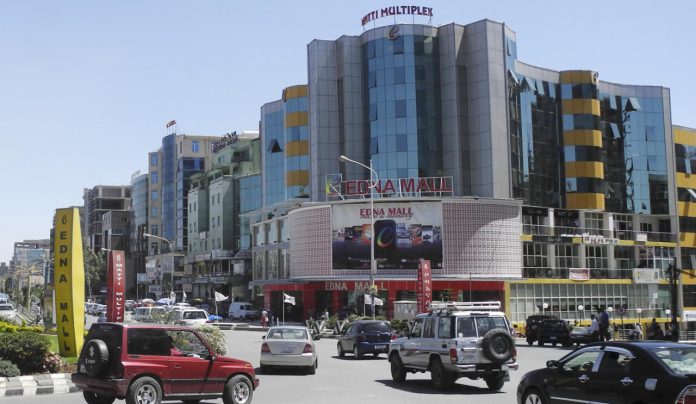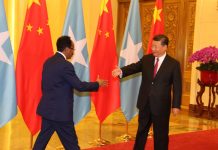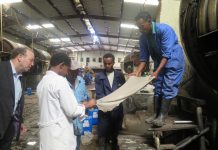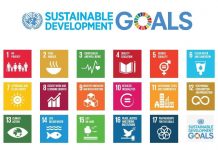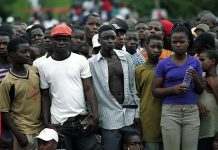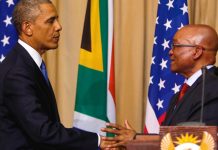Many are looking to us as the generation that will make a difference in Africa. Many are looking to us to unlock Africa’s potential. I want to challenge us as a people, I want to challenge us as a group, to work together, to partner to be that generation that will make a difference in Africa. I agree it will take a long time, that’s why I talk about “the generation” – a generation is like 30 years. If we start at it now, it will not be too late.
I want to begin with an African proverb. It says, “You can’t be taller than me and be shorter than me at the same time.” What this proverb is saying, is that our perceived weaknesses may well provide the opportunity and the motivation we need to build the Africa of our dreams. Think about that as I go through my presentation because I want to point out three areas where we are perceived to be weak, three areas that potentially may well have the opportunity for the growth that Africa can experience and will experience over this next century.
A war we can win
I have called these three things “necessary and sufficient conditions.”
- Human capital development
- Enabling environment
- Integrity and discipline in execution.
If we get our human capital development right; get the enabling environment, and integrity and discipline, we can achieve the Africa of our dreams.
This is a big challenge, but I am optimistic that this is a war we can win. A war it is. It is a war to deal with the issues around our human capital development; it is a war to deal with issues around creating the right enabling environment for business to prosper and for people to reach their full potential; it is a war to create an environment where integrity and discipline are the driving values of the society that we seek to build. But I fully believe it is a winnable war. I believe it is a war we can and should win.
Human capital development: Crisis = opportunity
The youth dividend. If you think about the African youth, what do you make of the African youth? At one level we are talking about youth unemployment, we are talking about the widening income disparity. Some have called it a ticking time bomb. And yet, properly addressed, this thing could yield dividends. The so-called population and demographics dividend will come out of the same African youth that we are talking about. So a lot depends on what we do with what we have.
Population matters. Notice how many African countries in 2050 are in the top ten most populous countries in the world. Three – Nigeria, Ethiopia, DRC. Africa as a continent is also expected to make a fairly dramatic shift in terms of this population. And there is a growing consensus that population matters in the wealth of nations. Of course a lot depends on what you do with it, but population does matter.
But there is a challenge. When you think about African population, it’s not to just having the population per se that yields the dividend. It’s what you do with it. Back to human capital development: what are we going to do with our population?
In terms of tertiary education and just human capital development, Africa still lags behind most of the other regions of the world. This is something we must get right if we are going to reach our full potential.
Can the 21st Century be the African century? That will only happen if we invest massively in human capital development. It’s not just about doing an MBA in the elite business schools. It’s also about training people to be productive. It’s also about making the most of the lives of people and helping people to reach their full potential.
Building an enabling environment: Context matters.
One of the key insights of Malcolm Gladwell’s book, Outliers, is that context matters. We know from experience that no individual or nation develops in a vacuum. One of the arguments made by the keynote speaker at ABC 15 years ago, former finance minister of Ghana, is still relevant today: we have to move beyond the basic forms of capital like commodities to the higher levels of capital. He talked about reputational capital, he talked relationship capital, he talked about human capital at its best.
Today, we are still dealing with the same sort of challenges. We would be very wise to think in terms of people, not just in terms of minerals, beneath the ground and so on because people will make the difference. Our greatest asset has to be our people. Investing in our people is what will unlock our potential.
The infrastructure. We also need to build the infrastructure that it takes to create a vibrant economy. I’m not just talking about roads and so on. I’m talking about soft infrastructure as well: rule of law, property rights, and so on. One of the reasons why I am so optimistic about Nigeria’s future is that we are finally tackling the electric power deficit and problem. How are we tackling it? By inviting private capital and private partnership ,the private sector to partner with the government and with the country to unlock the power because without it I don’t think there is enough resources that government can muster to do that on its own.
Access to capital. Capital flows to where it will earn a good return. It’s only wise, given the enormity of the resources that are needed, that we continue to have this type of dialogue about how to create the right partnership between the various stakeholders – government, private sector, civil society, and all. I believe that there is power in partnership. I believe that we ca create win-win partnerships that can develop the African continent and the African economy.
The power of adversity. Adversity can actually propel nations forward. Adversity can actually propel people forward. Like the African proverb says, you can’t be taller than me and shorter than me at the same time. You’ve heard the expression, “a crisis is too good an opportunity to waste.” We can make adversity become a good thing instead of a bad thing if it is used well.
Integrity and discipline in execution: Delaying gratification
If you bring integrity and you bring discipline, you can do well in the long term. It is extremely important that we think long term. One of the challenges is this short term versus delayed gratification. It is wise to delay gratification and stick to one’s values.
The Singapore lesson – tackling corruption as the #1 hygiene factor. Singapore took the view very early on that corruption can be a problem if not addressed quickly. They took the view that the system must reward good behavior and punish bad behavior.
Agency theory of man. If there’s one thing we have learned through the ages, it is that man is self-interested. That is where the agency theory of man comes in. We have to create systems that reward people for doing what is right, those systems that appeal to people for doing right for rational reasons — because man, ultimately, is somewhat rational.
Discipline. There is a lot of talk about strategies. Great strategy with poor execution will yield little or no results. Ultimately, people care about what you do, not what you say you will do. We must walk the talk if we’re going to make the most of the opportunity we have.
Okechukwu “Okey” Enelamah, M.D., is a founder and chief executive officer of Africa Capital Alliance, a leading independent private equity firm that invests mainly in Nigeria and surrounding West African countries. He is a member of the Advisory Board of Africa Venture Capital Association and the Emerging Markets Private Equity Association, and a Fellow of the Aspen Institute. He has a MBA with high distinction (Baker Scholar) from the Harvard Business School and is a Chartered Financial Analyst. The above is an edited excerpt of his speech at the 16th Annual Africa Business Conference at Harvard Business School, hosted by the Africa Business Club, a member of Student Clubs of HBS, Feb., 28-March 2, 2014.


